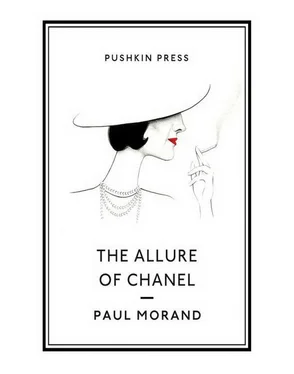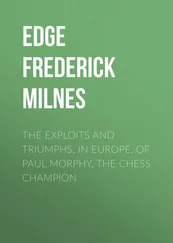The number of women I’ve seen die under the subtle, heady influence of the ‘ghastly old queen’: death, drugs, ugliness, ruin, divorce, scandal, nothing is too good to destroy the competition and take one’s revenge on the woman. Queens want to be women, but they are very bad women.
“They are delightful!”
To get the better of her, they follow her around like shadows everywhere, except to bed; queens work as interior decorators, hairdressers, designers(!), and, above all, as couturiers. They plunge them into a deadly kind of eccentricity, into their artificial hell; in the depths of the abyss I can see them all, my dear friends of yesterday: Béatrix, Florimonde, Clarissa, Barbara, I can name them, count them, but alas not on my fingers.
When I say “homosexuals”, I’m talking about the homosexual spirit, naturally enough, for we all know some excellent, doting fathers, who play the wallflower at dances, who are on the look-out for a good match for their daughters, and who are merely subconscious inverts. Social bodyguards, leaders of decadence, they are the microbes of this gorgeous epidemic, the instigators of truly slanderous hats, the lauders of unwearable dresses, the long-winded and deceitful critics of stiletto heels, the virulent propagators of furniture padded in white satin. They are the only men who like make up and red nails. They form part of the sly, gossip-mongering army of which the cynical, bearded, dirty homosexuals, with their filthy hair in a bun, their gnawed fingernails and their greenish teeth are only the advance guards; they haven’t the avant-garde tastes of this old guard, but they maintain the link between it and women; they create the climate. And their favourite vehicle is the poetry of couture.
… And there’s no more art of couture! I repeat: couture is a technique, a job, a business. It may be that there is an awareness of art, which is already a great deal, that it excites artists, that it accompanies them in their cars, on the path to glory; that a bonnet with ribbons should be immortalised in an Ingres drawing, or a hat in a Renoir, so much the better, but it’s an accident; it’s as if a dragon-fly had mistaken Monet’s Waterlilies for the real thing and had alighted there. If an outfit attempts to match a fine, statuesque body or to enhance a sublime heroine, that’s wonderful, but it does not justify couturiers persuading themselves or thinking of themselves—or dressing or posing—as artists … they’ll eventually fail as artists.
Three years before the war, I was the target for a great offensive from journalists-poets-couturiers. Their leader, Bébé Bérard, had organised a campaign: he was infuriated by my friendship with Dali.
MONEY IS PROBABLY AN ACCURSED thing, but does not our entire civilisation derive from a moral concept based on evil? Without original sin, there would be no religion. It is because it is an accursed thing that money should be squandered.
I judge people according to the way they spend.
I would say to women: never marry a man who has a purse.
Yes, you don’t need enthusiasm in order to earn money, you need it in order to spend it. Money that is earned is merely material proof that we were right: if a business or a dress is not profitable, it’s because they’re no good. Wealth is not accumulation; it’s the exact opposite: it serves to free us; it’s the “I’ve had everything and that everything is nothing” of the emperor-philosopher. Just as true culture consists in chucking a number of things overboard; just as in fashion, you generally begin with something that is too beautiful in order to attain simplicity.
I’ll return to this when I discuss fashion; I will merely say in passing that one can be elegant and not have money.
But money for money’s sake, that grim obsession with wealth, has always struck me as an abomination.
Money is not attractive, it’s convenient.
When women love money for what it procures, that’s natural, but when they are in love with it, that’s appalling. The face of a pretty girl who talks to you about contracts, rent, or life or term assurance becomes so ugly! As for me, I belong to that breed of foolish women, women who think only of their work, and, once work is done, think of fortune-tellers, stories about other people, daily events and nonsense.
The only thing I really like spending is my strength. I would willingly use all my strength in persuading and giving. (A little later on I will tell you that fashion is a gift couturiers make to the age.) It pleases me infinitely more to give than to receive, whether it be at work, in love or in friendship. I have squandered millions. The richest men I have gone out with are those who have cost me the most.
I love buying; the dreadful thing is that once you have bought, you possess. I’m enchanted by small boutiques, haberdashers, second-hand shops, middlemen, clothes dealers. I love antique shops that look like those in Dickens or Balzac’s Peau de chagrin . Whenever I arrive in a town, I run away from the ‘pretty boutique’ full of those inept creations I designed ten years previously.
I have a hatred of hanging on to things. I prefer not to have to see the money, the books, the objects, the people that I have lent.
I only care for trivial things, or else nothing at all, because that is where poetry takes shelter. Almost all our emotional, social and moral troubles stem from the fact that we don’t know how to give anything up.
Love of money is a physical thing; it’s contagious, like a disease. I’m going to tell you a true story, which is rather like a tale by Maupassant. I was staying at my house in Roquebrune, on holiday. I summon my accountant, M Arsène, who comes down from Paris with his lady and his daughter, on the day train, second-class, a respectable gentleman free of any liabilities. M Arsène and his family are my guests for three days. On the third day, once work was over, I discover that M Arsène had bought himself a dinner jacket to come to the South of France and that he didn’t want to leave without having worn it for the first time. “Very well, M Arsène, I’ll take you to Monte Carlo this evening.” We walk into the gaming room.
M Arsène watches the bank notes flying around, the chips piling high, the counters crashing down. Within five minutes M Arsène won as much as his wages for one year. I go off to bed. M Arsène stays behind; he returns the next morning having won a great deal and lost it all. He returns to Paris. Two months later, there was a deficit in the accounts at rue Cambon. It was soon discovered that M Arsène had caught the train back and, on two separate occasions, had come to spend his Sundays in Monte Carlo.
Money adds to the decorative pleasures of life, but it’s not life.
It’s like jewels. Nothing looks more like artificial jewellery than a very beautiful gem. Why allow yourself to become obsessed with the beautiful stone? You might as well wear a cheque around your neck. A jewel is valued for its bright colours, for its mystique, for its ornamental value: all the values, except those that are reflected in carats. If the jewel is a symbol, an abstraction, then it’s the symbol of servility, of injustice or of old age; very beautiful jewellery makes me think of wrinkles, of the flaccid skin of rich old ladies, of knobbly fingers, of death, of wills, of lawyers, of undertakers. A very white earring on the lobe of a well-tanned ear delights me. One day, at the Lido, I saw a respectable, elderly American lady sitting beneath a parasol; all the young American women who were about to go swimming entrusted their jewellery to her; eventually she looked like one of our Holy Virgins in the Auvergne that are festooned with precious stones; the relics of St Mark’s paled beside her. “How much more beautiful these young women would be,” I thought, “if they dipped their pearls into the waves, into the sea from which they first came; and how brightly their jewellery would glitter if worn on a skin bronzed by the sun, that has lain on the sand!” That distraught stare of envy, those calculating gazes of women who admire the tiaras or bracelets of other women arriving at a party entrance me. I love to lend my jewellery, just as I would lend a scarf or a pair of stockings. I never tire of the pleasure women take in looking at themselves wearing my jewellery, and that sweet smile of gratitude tinged with a longing to kill me …
Читать дальше












